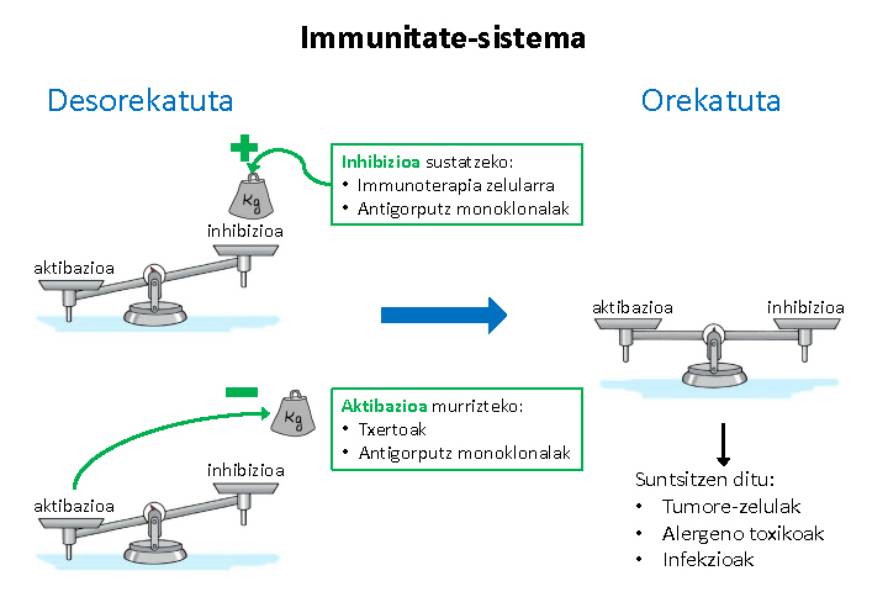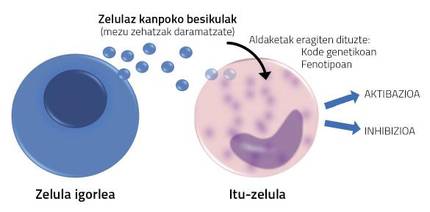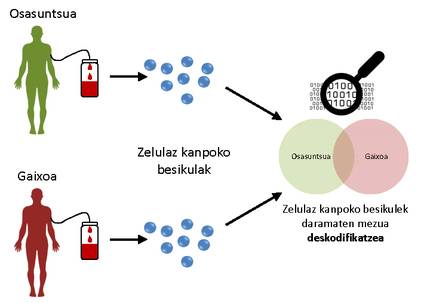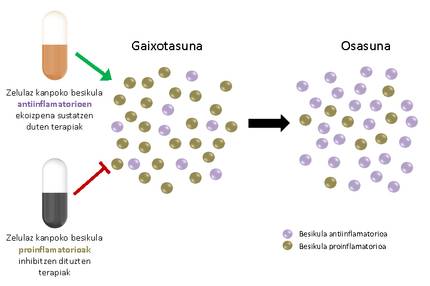Can we hack the immune system?

In some laboratory of Biodonostia it has been said that the immune system is like the two faces of Jano, referring to the Roman god mentioned when something has two totally different aspects. In fact, the immune system protects us from external infections and helps several systems to make the body work properly, but it is also the origin of certain problems in the imbalance. Examples of this are allergies or autoimmune diseases that act against natural tissues. A system failure can also contribute to cancer if it does not completely remove tumor cells. Therefore, the XXI is to control the immune system. One of the main objectives of medical science of the twentieth century.
But how can we control it?
There are two main pathways of controlling the immune system: strengthening its inhibitor effect and avoiding an abnormal response of the system. However, to develop treatments that affect the immune system, it is necessary to know its functioning well.
Scientists concentrate on it and in the last decade have discovered a mechanism of communication between distant cells. Through it, a cell can send messages to other cells through body fluids (blood, cerebrospinal fluid, urine, saliva, etc. ). These messages are called extracellular vesicles.
How do the extracellular vesicles work?
Extracellular vesicles are small spheres with plasma membranes that every living cell can eject in a controlled manner. The emitting cell “loads” the information (lipids, proteins, glycoproteins and small RNA) in the vesicles and expels them from the cell. When they are received, through the information they contain, they will have a certain influence on the target cell. We can say that it is equivalent to the messaging service used by mobile phones: the system of extracellular vesicles would be “WhatsApp of cells”, that is, short, concise and fast messages between a transmitter and one or several receivers.

Deciphering vesicular message
The main objective is to decipher the message that the vesicles carry from one cell to another of the immune system in cardiovascular diseases, diseases of the nervous system and cancer, among others, and compare it with what happens in healthy people. We know that the molecules that transport the vesicles are able to modify the phenotype or appearance of the target cell, as well as its genetic code. Furthermore, the emitting cells can enrich this vesicular content to ensure its effect on the target cell.
In addition, extracellular vesicles are able to initiate an immune response because they can load antigens into their membrane and present them to lymphocytes, giving a stimulus to activate them. All this new knowledge has made it necessary to recognize the existence of a new mechanism of cellular regulation and the complexity and flexibility of cell biology compared to what we think.
Research into cancer has shown that extracellular vesicles play an important role in extending the tumors to a remote organ or tissue. The vesicles released by the tumor facilitate the travel to other organs and metastases there. These vesicles contain oncoproteins that promote the fixation of metastases and cell invasion and angiogenesis necessary to ensure food.
The objective is, therefore, to decode the messages that carry the extracellular vesicles or, as it is said in the computer, hack them and use them for the benefit of patients.
How can the immune system be made?
An option can be through extracellular vesicles. Understanding the messaging system used by the vesicles would allow to stop vesicles that could be harmful to the organism and promote or stimulate beneficial. In addition, the orientation of treatments toward extracellular vesicles would have a remarkable advantage over the immunomodulatory therapies currently used, as they would be more specific and produce fewer side effects.

For the study of a person's extracellular vesicles, it is sufficient to obtain a small sample of body fluids. Normally blood is used, since the vesicles can reach all the organs through it. From this sample, the vesicles can be isolated by different techniques. In addition, insulation techniques are being simplified in order to apply them in all health centers. Once isolated, extracellular vesicles are analyzed, that is to say, detailed studies of proteins, lipids, glucides and RNA, to try to identify their origin (which cells emitted) and understand what messages and where they lead. If most of the vesicular message is harmful, such as proinflammatory or oncogenic, they develop and test molecules that act on some part of that message to inhibit their function. However, if in the message of isolated vesicles there are anti-inflammatory factors or inhibiting molecules that are beneficial to fight a disease, try to stimulate its production.
Consequently, extracellular vesicles are the subject of treatments against diseases with an unbalanced immune system.
In addition to being the subject of future treatments, extracellular vesicles can be a treatment pathway. In vitro stimulated vesicles are currently being used in two clinical trials, such as support therapy, in patients with melanoma and lung cancer. On the other hand, instead of using natural vesicles manipulated in vitro, therapies have also been developed using synthetic vesicles charged with RNA interference and anti-inflammatory interleuks. The advantages offered by these trials with respect to conventional therapies (cell phones or pharmacological) are high tolerance and the absence of side effects, as well as the possibility of correcting the vesicles more precisely if surface receptors are added.
More benefits for patients
The knowledge of this cellular messaging system also allows us to follow up on diseases. As with a simple adaptation of the dose of insulin in a reactive list, the investigation of extracellular vesicles leads to something similar. It is likely that in a few years a blood sample of a patient will be placed on a reactive list in which extracellular vesicles are captured, identifying the message they carry and recognizing the condition of the disease. In other words, vesicles are the source of biomarkers useful for the diagnosis or follow-up of certain diseases. Numerous scientific publications guarantee this benefit, fundamental for diseases without known and difficult to follow sensitive biomarkers. In addition, obtaining information with a small blood sample reduces the frequency of biopsies and subsequent complications.
From utopian desire to reality

Spain is one of the best levels of organization in extracellular vesicles research. In 2012, the Spanish Extracellular Vesicular Research and Innovation Group (GEIVEX) was created, bringing together more than 150 researchers working in this field. The main lines of work are related to cancer, the immune system, and communicable diseases. They mainly study the function of extracellular vesicles, the information they carry between cells and their use as treatments or biomarkers. Multiple sclerosis and liver diseases units of the Biodonostia Health Research Institute are actively involved in GEIVEX.
One of the works carried out by the multiple sclerosis unit at GEIVEX was the 3rd international edition of GEIVEX held in September 2016. Constitution of the organizing committee of the Symposium. The main theme of the symposium was the approach of vesicles to clinical practice, mainly as treatment. The NH Collection Aranzazu Hotel in San Sebastian hosted about 120 scientists, both researchers and members of companies interested in this innovative field.
However, to realize the clinical applications of the extracellular vesicles, it is necessary, first of all, to regulate the working protocols. For this reason, a section of the symposium discussed the unification of vesicular isolation methods of different tissues or fluids, the platforms used for their quantification and classification, and the omic analyses, in order to obtain comparable results without interpretive errors.
Another important section of the symposium analyzed the innovative aspect of biotech companies in the use of extracellular vesicles for the diagnosis of diseases. Some companies presented kits to isolate, detect, and analyze vesicles quickly and effectively.
Thanks to the commitment of the Local Organization Commission, and also to the Basque Government, which subsidized the organization of the event, the symposium has been achieved as a turning point in the clinical vision of extracellular vesicles. Our last reflection is the need to bring this new knowledge closer to patients with maximum speed, quality and safety, objective of all research.





